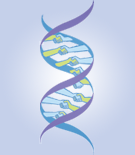Gunawan:Ang Kok Siong: Difference between revisions
(New page: {{Template:Gunawan}} <!-- Delete this entire line as part of your first edit of your user page --> {{New user}} ==Contact Info== [[Image:OWWEmblem.png|thumb|right|Ang, Kok Siong (an artis...) |
|||
| Line 23: | Line 23: | ||
# Control Systems | # Control Systems | ||
# Global Optimization | # Global Optimization | ||
Paremeter Estimation of Oscillatory Systems | |||
Oscillatory behavior is exhibited by many biological systems. Examples these include the circadian rhythm and p53-mdm2 response to DNA damage. Such dynamical behavior is important and integral of a higher biological function, such as sleeping and feeding patterns (circadian rhythm) and DNA repair (p53-mdm2). To study these systems, in-silico models have been developed to aid in the analysis. However, the corresponding model parameters are usually chosen qualitatively such that the system to exhibit the general characteristics of experimental data. The focus of the research here is to facilitate reconciliation of the model with experimental data in a quantitative manner. | |||
==Publications== | ==Publications== | ||
Revision as of 10:21, 17 July 2008
Chemical and Biological Systems Engineering Laboratory
I am a new member of OpenWetWare!
Contact Info

- Ang, Kok Siong
- National University of Singapore (NUS)
- 4 Engineering Drive 4, Blk E5 #B-05, Singapore 117576
- Singapore
- Email me through OpenWetWare
I work in the Gunawan Lab at National University of Singapore.
Education
- Student, M.Eng, NUS
- 2006, B.Eng, NUS
Research interests
- Systems Biology
- Control Systems
- Global Optimization
Paremeter Estimation of Oscillatory Systems Oscillatory behavior is exhibited by many biological systems. Examples these include the circadian rhythm and p53-mdm2 response to DNA damage. Such dynamical behavior is important and integral of a higher biological function, such as sleeping and feeding patterns (circadian rhythm) and DNA repair (p53-mdm2). To study these systems, in-silico models have been developed to aid in the analysis. However, the corresponding model parameters are usually chosen qualitatively such that the system to exhibit the general characteristics of experimental data. The focus of the research here is to facilitate reconciliation of the model with experimental data in a quantitative manner.